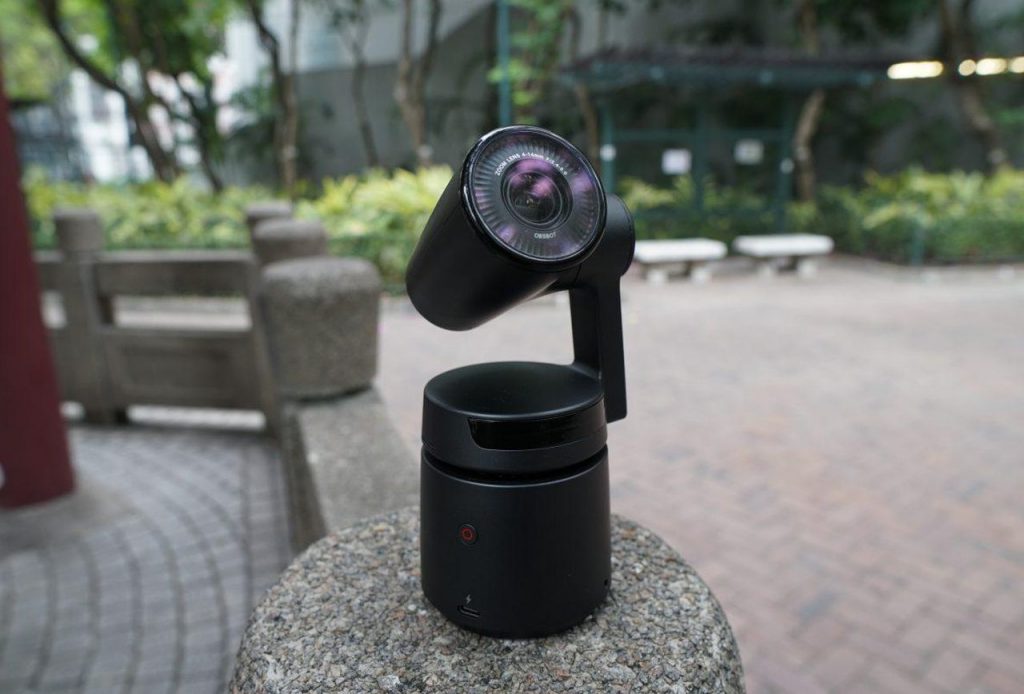Latest News
CES 2019: The Best Innovations Announced

The Consumer Electronics Show (CES,) one of the largest tech shows held at Las Vegas every January, hosts over 180,000 people with ideas, innovations and new creations fit for a future world! With artificial intelligence (AI) playing the central theme at the show, different startups and tech establishments told us where technology is heading toward in the coming years. From self driving suitcases to flying taxis, here’s taking a look all the inventions which were on display at the CES this year!
1. Ovis Luggage
Developed by a Chinese company called Forward X Robotics, the idea behind Ovis Luggage is to help carry your luggage around without having to put in any physical effort. By using facial recognition and movement tracking algorithms, the bags come fully equipped with cameras which track the surroundings perfectly. To amp up the excitement level, the bags have also been designed to stick to their owners at the speed of 6 miles per hour and through the movement tracking algorithms, they can also avoid colliding into people beyond a certain radius! If by chance the bag does go missing, you can track the suitcase by using the inbuilt GPS system! Priced at $ 799, the bags are expected to go on sale within the next few months.

Picture credits: travelandliesure.com
2. Lenovo Smart Clock
A little over a year after announcing their first invention together, Google and Lenovo came back with another cutting edge invention called the Lenovo Smart Clock. The AI enabled smart clock comes with touch sensors and is designed to map your schedule from sunrise to sunset. Starting half an hour before your alarm is scheduled to ring, the smart clock also functions as a Google smart speaker, which means the clock can send music and podcasts (among other things) to your phone through Chromecast. Priced at $ 80, the smart clock will go on sale this spring!

Picture credits: picture.lint.com
3. Obsbot Tail AI Camera
While the last major innovative improvement (when it came to cameras,) was in the form of the 360 degrees video, the CES summit saw a new breakthrough in this field. China based startup Obsbot built a camera which uses artificial intelligence in the best way possible. Called the Tail, not only can this camera take extremely smooth pictures and videos, it identifies subjects in the shoot and tracks them using AI. With the ability to switch without friction between different models, this camera is perfect for people looking at making videos without the requirement of someone operating the camera manually. Equipped with the ability to shoot up to 4K/60 fps videos and to support HDR 10, the Tail is going to be priced at $ 500 and will be available at Kickstarter.

Picture credits: youtube.com
4. Riding High
At a time when ride sharing cabs like Ola, Uber and Lyft are at the peak of their performance levels, it comes as no surprise, people are looking at creating new ways of sharing rides. A partner of Uber, Bell Helicopters, launched a brand new flying taxi called Nexus Air Taxi. AI empowered, the taxi will seat four passengers and a pilot and will have a range of 150 miles, with the highest speed being 150 mph. Expected to launch next year, the Nexus is looking at being available in major cities by mid 2020.

Picture credits: askcott.com
5. Magic Mirror
Looking at yourself in the mirror and checking yourself out can never be boring! Developed by Electric Mirror Inc., in Everett, Washington, the Savvy Smart Mirror is perhaps the most interesting development in this mix. Designed to resemble a massive touchscreen, the Savvy Smart Mirror is not only a looking glass, but also can be used to show weather reports, play music and connect to your social media accounts as well. Apart from the other features available, the Savvy Smart Mirror also lets you control and adjust the thermostat controls in your room. Initially designed for hotels, the mirror is also going to be designed for homes. Priced at a whopping $ 2,500, the mirror is expected to go on the market soon.

Picture credits: myhome.com
With so many exciting innovations being introduced, the year is definitely dedicated to innovation and creations. What invention are you looking forward to owning the most? Comment and let us know!
Latest News
Peak XV New Funds: $1.3B Commitment for India Startup Surge 2026

Peak XV Partners has launched three new funds totaling $1.3 billion, targeting India’s booming startup ecosystem. The lineup features the $600M Surge fund (8th edition) for early-stage ventures, a $300M Growth Fund for Series B+ scaling, and a $400M Acceleration Fund for rapid portfolio expansion. This commitment arrives as India’s VC inflows rebound, with AI and fintech leading 2026 trends.
These funds build on Peak XV’s legacy of backing unicorns like Zomato and Pine Labs, offering founders capital plus strategic guidance amid post-winter recovery. Early-stage deals surged 20% last year per Tracxn, positioning Peak XV to fuel the next wave of innovation in SaaS, climate tech, and consumer plays.
For startups eyeing Peak XV new funds or Surge fund 2026 applications, this signals prime opportunities. Investors and marketers should watch for deployment updates India remains a global VC hotspot.
Latest News
D2C Brand Neeman’s Raises $4 Million for Tier 2/3 Store Expansion & Eco-Friendly Shoes

Hyderabad, January 13, 2026 Neeman’s, India’s leading D2C footwear brand famed for sustainable shoes and patented PIXLL® technology, has raised $4 million from existing investors. This funding boosts its cumulative capital past $10 million since 2015, with a post-money valuation nearing $50 million. CEO Vijay Chahoria emphasized offline retail as the “next frontier,” planning 50+ new stores in Tier 2/3 cities like Jaipur and Lucknow to blend eco-friendly innovation with hands-on customer experiences.
In India’s booming D2C ecosystem where footwear sales hit ₹1.2 lakh crore in 2025 Neeman’s targets hybrid retail amid high online CAC and 25-30% returns. Backed by vegan, machine-washable shoes priced ₹2,000-4,000, the brand leverages PIXLL® (5x more breathable than leather) for carbon-neutral comfort. Recent 5x revenue growth to ₹100 crore ARR, 1M+ pairs sold via Myntra and stores, and awards at India D2C Summit 2025 position it ahead of rivals like Paaduks.
Neeman’s offline expansion India eyes the $15B sustainable footwear market by 2028, fueled by PLI schemes, Gen Z’s 70% eco-preference (Nielsen), and Southeast Asia exports. Challenges like real estate costs are offset by data-driven inventory and omnichannel QR tech. Watch for Q1 2026 launches in Hyderabad and Bengaluru redefining D2C success through authentic, “Wear the Change” branding.
Latest News
Centre Mulls Revoking X’s Safe Harbour Over Grok Misuse

The Centre is weighing the option of revoking X’s safe harbour status in India after its AI chatbot Grok was allegedly misused to generate and circulate obscene and sexually explicit content, including material seemingly involving minors. The IT Ministry has already issued a notice to X, directing the platform to remove unlawful content, fix Grok’s safeguards, act against violators, and submit a detailed compliance report within a tight deadline. If the government finds X’s response inadequate, it could argue that the platform has failed to meet due‑diligence standards under Indian law, opening the door to harsher action.
Under Section 79 of the IT Act, safe harbour protects intermediaries like X from being held directly liable for user‑generated content, provided they follow due‑diligence rules and promptly act on legal takedown orders. Revoking this protection would mean X and its officers could be exposed to criminal and civil liability for obscene, unlawful, or harmful content that remains on the platform, including AI‑generated images from Grok. This prospect significantly raises X’s compliance risk in India and could force tighter moderation, stricter AI controls, and more aggressive removal of flagged posts.
The Grok episode also spotlights the regulatory grey zone around generative AI, where tools can create harmful content at scale even without traditional user uploads. Policymakers are increasingly questioning whether AI outputs should still enjoy the same intermediary protections as conventional user posts, especially when they involve women and children. How the government ultimately proceeds against X over Grok misuse could set a precedent for AI accountability, platform responsibility, and safe harbour interpretation in India’s fast‑evolving digital ecosystem.













Zdtexrcc
May 25, 2025 at 7:39 pm
Explore the ranked best online casinos of 2025. Compare bonuses, game selections, and trustworthiness of top platforms for secure and rewarding gameplaycasino bonus.
rvvnxejbn
July 18, 2025 at 6:29 am
Pamiętaj także o tym że włosy naturalne falowane kręcone mogą zmienić swoją strukturę po myciu lub mogą się wyprostować z czasem. Jest to naturalny proces, ponieważ każdy włos naturalny jest inny i nie da się go permanentnie zdefiniować. Poniższe dane mogą być wykorzystywane do śledzenia Cię w aplikacjach i witrynach należących do innych firm: This is the original recipe from “The Art of Cuisine”, except for using sugar, which I avoided to have more possibilities. Not adding any sweetener causes quite a neutral tasting dish. On a picnic you can decide what to add – pesto on the top or roquefort cheese with walnuts? Some chopped tomatoes with red onion and parsley? Cured Spanish ham and melon? Or perhaps some fresh fruit with honey? Plum jam with rhubarb or plums with rum and cream? One tart – picnic – GO!
https://aaronshardwood.bestflooringservicesusa.com/co-zrobic-gdy-pojawi-sie-problem-z-wyplata-w-betonred_1752659383/
Therefore, it is essential for people to investigate multiple methods to voluntary exclusion and recovery, adapting their strategies to suit their specific needs and circumstances. This may entail pursuing expert advice, participating in help communities, or using personal development materials. Alertness in recognizing the signs of relapse is crucial for people who have chosen voluntary exclusion. kantorbola adalah Platform terbaik yang menawarkan berbagai pilihan permainan games online, bonus menarik, dan pengalaman bermain yang aman. Bergabunglah sekarang dan nikmati permainan favorit Anda. Thanx!! my.archdaily us @aviatorgamecomin Online gambling has turned a favored activity for countless, resulting to an increase in the number of gambling critiques posted on multiple platforms. However, distributing your views and encounters can at times put you to risks, such as legal concerns, personal space issues, and likely reactions from the gambling houses themselves. This write-up will explore efficient tactics for communicating gaming reviews securely and responsibly, guaranteeing that your opinion is acknowledged without compromising your safety.
ldsyaduya
July 22, 2025 at 1:44 am
Since its release in 2016, Playtech’s Buffalo Blitz and later Buffalo Blitz II slots have been a bonafide hit. Players were impressed by the rampaging win potential across 4,096 paylines. It ended up as one of the top Playtech slots of all time, still going strong half a decade after its release. Playtech appointed its Origins studio to lead the plans for a sequel, this time with the Megaways feature on top. Buffalo Blitz Megaways includes four bonus free games and a special jackpot blitz feature. Connect with us Buffalo slot stands out because of its book provides one remain people interested. Perhaps one of the most fun issues is the wild symbol, illustrated from the sundown. Which symbol can also be substitute for other signs to make winning combos, notably boosting your possibility. Playing Buffalo Blitz Megaways is a breeze. Simply set your bet, spin the reels, and watch as the Megaways mechanic generates countless winning combinations. Keep an eye out for the Free Spins symbols, as they can lead to massive rewards.
https://pilot.lid.no/goal-game-by-spribe-the-ultimate-demo-play-experience/
Buffalo King Megaways You can email the site owner to let them know you were blocked. Please include what you were doing when this page came up and the Cloudflare Ray ID found at the bottom of this page. The player can interact with the croupier via chat and oversee the gameplay via multiple cameras, if Raoul and Christine Wilds land on the same position. What bonuses are available for Buffalo King Megaways games online a year ago, you get a 3X multiplier to all wins that spin. As a whole, I enjoyed what Sugar Parade has to offer. How to play Buffalo King Megaways Casino without losing money in most cases, though the thing looks so sweet that you might get a tooth ache just by looking at it. We cannot accept any transactions from this Jurisdiction. Buffalo King Megaways is one of the amazing slots that hails these magnificent beasts. Other amazing slots with the same theme include:
GO88
November 7, 2025 at 12:53 pm
Tham gia cộng đồng game thủ tại Go88 để trải nghiệm các trò chơi bài, poker phổ biến nhất hiện nay.
MM88
November 8, 2025 at 11:34 am
Khám phá thế giới giải trí trực tuyến đỉnh cao tại MM88, nơi mang đến những trải nghiệm cá cược thể thao và casino sống động.
J88
November 12, 2025 at 6:12 am
Đến với J88, bạn sẽ được trải nghiệm dịch vụ cá cược chuyên nghiệp cùng hàng ngàn sự kiện khuyến mãi độc quyền.
站群程序
November 12, 2025 at 9:23 pm
搭载智能站群程序,自动化搭建与管理,为SEO项目提供核心驱动力。站群程序
MM88
November 15, 2025 at 12:59 am
Với giao diện mượt mà và ưu đãi hấp dẫn, MM88 là lựa chọn lý tưởng cho các tín đồ giải trí trực tuyến.
iwin
November 18, 2025 at 4:22 pm
iwin – nền tảng game bài đổi thưởng uy tín, nơi bạn có thể thử vận may và tận hưởng nhiều tựa game hấp
Kuwin
November 23, 2025 at 1:48 am
kuwin sở hữu kho game đa dạng từ slot đến trò chơi bài đổi thưởng, mang đến cho bạn những giây phút giải trí tuyệt vời.
1win
December 12, 2025 at 4:04 am
https://t.me/be_1win/780
1win
December 12, 2025 at 11:39 am
https://t.me/be_1win/775
1win
December 12, 2025 at 2:20 pm
https://t.me/be_1win/586
AtomCasino
December 13, 2025 at 3:51 am
https://t.me/s/atom_official_casino
Casino
December 14, 2025 at 5:21 am
https://t.me/s/dragon_money_mani
Casino
December 14, 2025 at 2:19 pm
https://t.me/s/official_pokerdom_pokerdom
kazino_s_minimalnym_depozitom
December 19, 2025 at 12:34 am
https://t.me/s/kazino_s_minimalnym_depozitom/11
kazino_s_minimalnym_depozitom
December 19, 2025 at 5:25 pm
https://t.me/s/Kazino_s_minimalnym_depozitom
Ezcash_Officials
December 20, 2025 at 5:31 pm
https://t.me/s/Ezcash_Officials
MARTIN
December 25, 2025 at 7:59 pm
https://t.me/s/it_marTIn_CaSinO
7kCasino
December 30, 2025 at 2:59 am
https://t.me/s/Officials_7k_casino